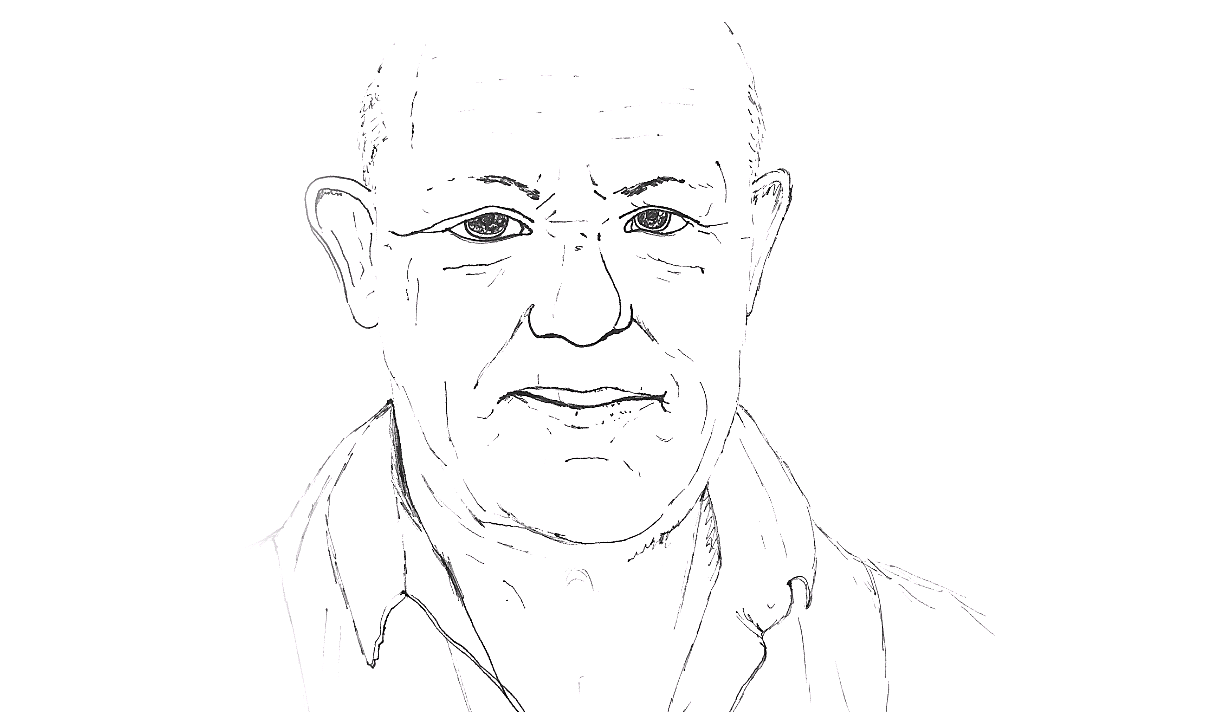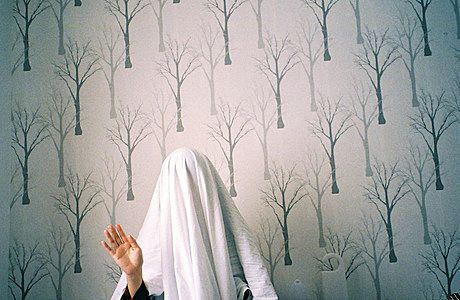Letters From A Sane Man
"She isn't a friend because she's a writer. She's a friend because I like her."
Harrison Christian on the teenager who wanted to be a magazine editor, and the Lyttleton writer who patiently and pithily offered some tips on the craft. Cover illustration by Lennie Galloway.
Joe Bennett bought his house in Lyttelton without knowing how many bedrooms it had. Someone asked him how many after he'd sealed the deal, and he couldn't tell them. He just liked the idea of being up so high. The house had a seriously steep driveway. "Not for the faint of heart," he said.
When the earthquake hit, Joe was at home. There was a moment where everything felt adjacent to reality. Blue jumped a fence and started fighting the dog next-door. That was not like Blue at all. Joe separated the dogs, then walked into town giving out cigarettes. Everyone smoked after the earthquake.
Blue got in the habit of staying in Joe's car, parked in a garage under the house. Even a distant firework could send him there. It took him years to come out for good. The car's shock absorbers, Joe explained, reduced the feeling of the aftershocks. Meanwhile, a man in a fluorescent vest knocked on the door and tried to get Joe to leave his property. There was a risk, the man said, of falling boulders. But Joe didn't leave and the man stopped coming around. It was one of those over-the-top precautions.
The house was big and nice and deliberately out of reach from the rest of Lyttelton. Joe was the king of the castle, up there at the highest point on the slopes of a volcanic crater, looking down on a harbor and writing. His partner joked that he was a recluse. They bantered in the way good couples do, and led their own lives. His partner went out partying and came home when he got bored. It worked out fine for Joe.
The author liked people, just not in herds. It wasn't that he was some kind of literary snob. Far from it. "I don't mix with writers," he once said to a magazine editor who asked him to write about the literary scene. "I have only one friend who's a writer and she isn't a friend because she's a writer. She's a friend because I like her. So if I wrote about the literary scene I'd be guessing. And I'd guess rude things."
But there was Blue. Joe was an excellent dog trainer. He'd taught Blue to run around a table and weave through his legs and play dead. Most impressive was he'd done it all without using dog treats. He just gave Blue a celebratory tug on his toy when he finished a trick. The toy, Joe understood, was all Blue wanted. It triggered something instinctive in him. So during those training sessions, everything Blue did was just a gambit to get to the toy.
One day Joe got an email from a teenager who admired his work, and asked straight-out if Bennett could mentor him. "I'm a 19-year-old aspiring writer," the email said, "and I have no achievements to speak of. I do however think that I have discovered the kind of writing I should like to do." It was a preposterous email. An example of the posturing of adolescence. This young man was unemployed, without skills or direction, and extremely sure of his imminent success. But Joe agreed to mentor him.
He soon regretted his decision. The kid treated Bennett more like an editor than a mentor, and swamped him with little ditties he was writing. It was a lot of half-baked stuff. Often, Joe didn't reply. Finally though, he had to admit one of the submissions caught his eye, and he emailed back some encouraging words: "You write clearly and well. That's the sine qua non." His apprentice sent back a revised draft much too quickly. He was sure eager. "Yes it's better," Joe conceded. "Far better. But it hasn't arrived yet."
He imagined himself giving a sermon on adverbs from the top of the crater. Slamming the words out until they fell among the people of Lyttelton.
He began teaching his apprentice some basic tenets of writing. His first instruction was to always avoid adverbs. These were words that described or modified verbs, often ending in -ly, for example, "quickly." Adverbs, Joe found, could almost always be crossed out. "They are cholesterol in the veins of prose," he wrote. "If you can rid yourself of them, you will find the prose beginning to pulse."
He imagined himself giving a sermon on adverbs from the top of the crater. Slamming the words out until they fell among the people of Lyttelton. He was an English teacher at a college in Christchurch before he quit to write full-time. Bennett missed teaching. Not the daily grind, but the performance element. He'd happily poke his head back into a classroom and give a casual lesson.
As he aged, Joe was beginning to be bored by the world. "I’m an old and spent curmudgeon," he wrote to the kid. "I am all but sixty. Unthinkable but so. I now urge the years on."
And he flat out refused to glamorize his profession. If anything, he tried to scare his apprentice away from it. Self-styled literary people made writing out to be a mystical business. They were no different from shamans, witch doctors, priests and other frauds. Joe saw writing as a trade, like plumbing. No one suggested that plumbing was mystical. "This is not a business you want to get into unless you simply have to," he said.
When the kid was 21, he got his first big break. A magazine published a story he'd written about a protest in Auckland. "Oi, apprentice," Joe wrote, "I’ve read it and well done. It’s the best piece of yours I’ve read yet."
Of course, there were the usual caveats. "DON’T worry about having a style," he scolded. The apprentice was obviously writing pastiches of other writers' work. Good for practice, but Joe could spot the influences. "If you're writing what isn't yours," he continued, "you're not writing. Someone else is. You're channeling. You're the ventriloquist's dummy." What an image. Anyway, the glow from the magazine article didn't last long. Later that year the apprentice wrote that he was unemployed, unshaven and beginning to piss off his parents.
Joe wrote back telling him to leave home, shave and find work. "Everyone," he advised, "will profit." His apprentice did not shave or get a job, but he got on a plane and started backpacking across America. Had this Kerouacish idea of going from East to West, and just sort of zigzagged along. Joe could sympathize. He'd had itchy feet for half his life. Escaped England as a young man and lived in Spain and Canada. One time, he accepted a job in British Columbia without comprehending where it was on the map. He thought it was in South America.
"Trust me when I say you do not want me to go through this text in detail," he typed. "You don’t need it. You must and will become your own editor and best critic. Keep going."
If Bennett had been in Spain when he turned 30, he thought, that's where he'd still be living. But he was in Lyttelton when he turned 30. Something clicks at 30, he decided, sitting in his house on the hill with Blue's head on his lap. That was when people settled down. And the recompense was getting a dog. "It's almost as though you can't go any further," he thought. "Any direction you leave this island you're on the way back."
"Enjoy the road. Or endure it, at least," was the advice he sent to his apprentice. "Joe," came a reply in November. "Am in Phoenix, Arizona. Am poor. Am in love. Wanting to stay here, but plan was always to get to California eventually." Joe imagined the sweaty T Shirt, the scraggly beard. "I don't want to move on," the kid reflected, "but it seems unfeasible to stay. What's the strangest thing you've done for money? Am writing somebody's college paper for 50 bucks." "Everything we do for money," answered Joe, "is strange. Though I did once translate into French for 300 francs the technical specifications for a Saudi Arabian sewage plant."
When Joe's apprentice came back from America, he moved to Dunedin, enrolled in some papers at the University, and applied for a post at a national news outlet. Joe wrote him a brilliant reference. Hard and simple. Just like Joe. But the apprentice didn't get the job. The guy, now advancing through his 20s, was standing outside a bank on Dunedin's main street when he got the call, and he was literally speechless. It was another blow to his ego.
But it didn't stop him sending Joe a steady stream of stuff. Bennett would print it off and drink half a bottle of cheap shiraz before he was ready to give notes. "And trust me when I say you do not want me to go through this text in detail," he typed. "You don’t need it. You must and will become your own editor and best critic. Keep going."
The kid carried on using Joe's reference in other job applications, and it helped him land a reporting gig a year later. The reference was a big talking point in his interview. "I look forward to watching you climb previously unconquered peaks of journalism," Joe wrote. "Be brave and yourself and you will." ("Journalism by definition is bad prose," he later confessed.)
Seven years after he sent Joe that first cocky email, the apprentice, now almost 27, got on a plane to Christchurch to meet the man in person. He walked up that steep driveway in Lyttelton to receive Joe's scrutiny. It was hard not to think of it in terms of a pilgrimage. Bennett hollered down from the house to warn him that the dog was friendly. Sounded like God's voice coming out of the clouds. At the summit they shook hands. There was a silence while Joe just looked at him.
Then he lit up and said, "you old fucker," and invited the kid inside. It was a cold Friday night. Some kind of opera was playing in the kitchen. Joe poured himself a glass of red, from one of a handful of bottles on the counter. He was dressed in a cardigan and pajama pants, and his voice was almost as operatic as his music. Nowadays, his accent had developed a kiwi patina. He hit his apprentice with a lot of questions.
The kid's girlfriend came to pick him up, and Joe made a real impression on her. "There is a guy," she later said, "who gives zero fucks." Joe entertained them for hours, doing tricks with Blue in his living room. Then he went for a piss and came back to find them standing up. "Made a collective decision," he inquired, "to fuck off, have we?" They were full of wine. He walked them down his driveway. The apprentice hugged him goodbye, and Bennett stood at the bottom of the driveway, his pajama bottoms lit up in the car's headlights, guiding them as they turned the car around. "Keep going," his voice said.

